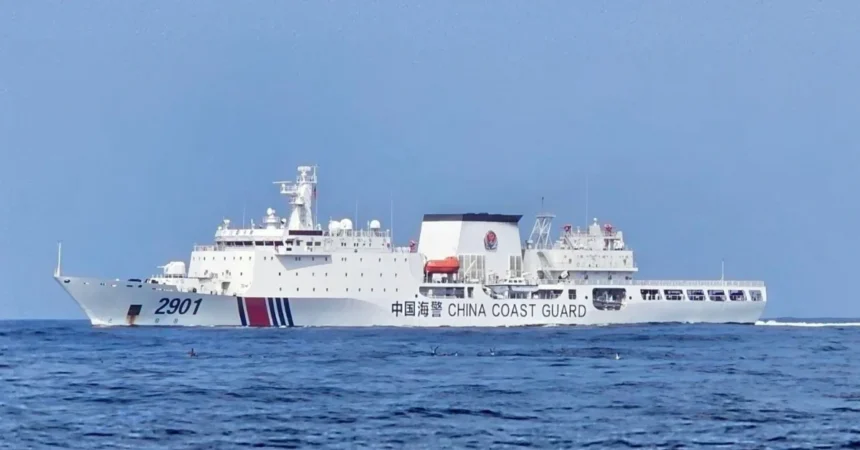Introduction
In a significant escalation of tensions in East Asia, China has expelled a Japanese fishing vessel from waters near disputed islands, a move that underscores the fraught relationship between the two nations. This incident not only highlights ongoing territorial disputes but also raises questions about maritime security, regional stability, and international diplomacy. This article examines the background of the dispute, the details of the incident, and its broader implications for China-Japan relations and regional geopolitics.
Background of the Dispute
The islands in question, known as the Senkaku Islands in Japan and the Diaoyu Islands in China, have been a longstanding source of tension between the two countries. Located in the East China Sea, these islands are strategically significant due to their proximity to vital shipping routes and potential underwater resources, including oil and natural gas reserves. The territorial dispute dates back to the late 19th century and has remained a contentious issue in diplomatic relations.
Historically, Japan has administered the islands since the late 1800s, while China claims sovereignty based on historical records. The tensions escalated in the early 21st century as both nations increased their military presence in the region. The establishment of a Chinese coast guard base nearby further complicated the situation, prompting Japan to bolster its own maritime security measures.
In recent years, there have been several confrontations between Chinese and Japanese vessels in the region, often leading to diplomatic protests and heightened military readiness. The nationalistic sentiments in both countries have fueled this rivalry, making it increasingly difficult to reach a peaceful resolution.
The Incident: Expulsion of the Japanese Ship
On October 17, 2024, the Chinese government announced the expulsion of a Japanese fishing vessel that it claimed had unlawfully entered Chinese territorial waters near the disputed islands. According to Chinese authorities, the ship was warned multiple times to leave the area before being forcibly removed by the Chinese coast guard. This incident was met with strong condemnation from Japan, which reiterated its claim to the islands and emphasized the legality of its fishing activities in the region.
The Chinese Ministry of Foreign Affairs stated that it would take “necessary measures” to protect its sovereignty and safeguard its maritime rights. This statement reflects China’s broader strategy of asserting its claims in the South and East China Seas, often through aggressive actions against foreign vessels perceived as infringing on its territorial waters. This incident raises alarms about the increasing militarization of the region and the potential for future clashes at sea.
Japan’s response to the expulsion included a formal protest lodged with the Chinese government. Japanese officials emphasized that their fishing activities were lawful and that they would continue to assert their rights in the region. The incident has reignited debates within Japan about its maritime defense policies and the need for a more assertive stance against Chinese incursions.
Implications for China-Japan Relations
The expulsion of the Japanese ship is likely to have far-reaching implications for bilateral relations between China and Japan. Both nations have a complex history characterized by rivalry, economic interdependence, and occasional cooperation. However, incidents like this one exacerbate tensions and complicate diplomatic efforts.
- Increased Military Presence: In response to the incident, Japan is likely to enhance its naval patrols in the region to assert its claims and ensure the safety of its fishing fleets. This increased military presence could lead to further confrontations at sea, raising the risk of accidental clashes between Chinese and Japanese vessels. Moreover, Japan may also seek to strengthen its defense alliances with the United States and other regional allies to counterbalance China’s growing assertiveness.
- Diplomatic Strain: The incident may hinder ongoing diplomatic negotiations aimed at resolving the territorial dispute. Japan’s government is likely to call for international support to address China’s assertive actions, potentially seeking backing from allies such as the United States. This could lead to a broader geopolitical confrontation in the region, further straining relations between China and Japan.
- Public Sentiment and Nationalism: Nationalistic sentiments in both countries are likely to intensify in the wake of this incident. In Japan, public opinion may shift towards a more hardline stance on territorial issues, pushing the government to take a firmer position against perceived Chinese aggression. Conversely, in China, the government’s strong response may be portrayed as a demonstration of its commitment to protecting national sovereignty, fueling nationalist sentiment among the populace.
- Economic Consequences: The expulsion may also impact economic relations between China and Japan. Both countries share significant trade ties, but heightened tensions could lead to disruptions in trade and investment. Japan’s fishing industry, in particular, may suffer as a result of heightened risks associated with operating in contested waters. This economic uncertainty could have cascading effects on local economies and contribute to the overall deterioration of bilateral relations.
Historical Context: A Cycle of Tension
The current incident is not an isolated event but part of a broader pattern of tension in China-Japan relations. Over the past decade, both countries have witnessed a series of confrontations in the East China Sea, including near-collisions at sea, airspace violations, and diplomatic protests. These incidents have created an atmosphere of mistrust and animosity, complicating efforts to foster mutual understanding.
The historical context of the Sino-Japanese relationship further complicates the situation. Memories of Japan’s wartime aggression during World War II continue to shape perceptions in China, fueling resentment and distrust. Conversely, Japan remains wary of China’s growing military assertiveness and regional ambitions, leading to a security dilemma where both nations perceive each other as threats. The legacy of past conflicts continues to haunt contemporary interactions, making it challenging for leaders to promote reconciliation.
The Role of the United States and Regional Allies
The United States has been a critical player in the dynamics of East Asian security, often positioning itself as a counterbalance to China’s influence in the region. Following the expulsion of the Japanese ship, the U.S. is likely to reaffirm its commitment to Japan’s security under the U.S.-Japan Security Treaty. This could involve increased military cooperation and joint exercises in the region to deter further Chinese aggression.
Regional allies such as South Korea and Australia may also be drawn into the fray, as they share concerns about China’s growing assertiveness in the Indo-Pacific. The situation presents an opportunity for these nations to strengthen trilateral security cooperation, bolstering collective efforts to maintain stability and uphold international norms in maritime conduct.
Furthermore, the United States may leverage this incident to rally support from other nations in the region to reinforce the principle of freedom of navigation in international waters. This could lead to increased joint maritime patrols and exercises, emphasizing the importance of maintaining a rules-based order in the Indo-Pacific.
Economic Implications
Beyond the immediate geopolitical ramifications, the incident could have significant economic consequences for both China and Japan. The East China Sea is a vital area for fishing and trade, and increased tensions may disrupt commercial activities, impacting the livelihoods of fishermen and businesses reliant on maritime resources. Japan’s fishing industry, in particular, could suffer as a result of heightened risks associated with operating in contested waters.
Additionally, the incident could deter foreign investment in the region, as companies may perceive the escalating tensions as a risk to their operations. This economic uncertainty could have cascading effects on local economies, further exacerbating tensions between the two nations. Businesses may seek to diversify their supply chains or relocate operations to avoid potential disruptions arising from geopolitical conflicts.
The Need for Dialogue and Resolution
In light of the ongoing tensions and the recent expulsion of the Japanese ship, it is imperative for both China and Japan to engage in meaningful dialogue to resolve their differences. Diplomatic channels must remain open to prevent further escalation and foster a cooperative framework for addressing maritime disputes.
Engaging in confidence-building measures, such as joint fishing agreements or shared resource management initiatives, could pave the way for improved relations. Furthermore, involving regional organizations and third-party mediators may provide an avenue for constructive dialogue and resolution. International cooperation is essential for promoting stability in the region and reducing the risk of future confrontations.
The expulsion of the Japanese ship by China near the disputed islands is a significant development that underscores the complexities of China-Japan relations. As tensions escalate, both nations must navigate a delicate balance between asserting their territorial claims and pursuing diplomatic solutions. The historical context, economic implications, and regional dynamics surrounding this incident necessitate a proactive approach to diplomacy and conflict resolution. Ultimately, fostering mutual understanding and cooperation will be essential for ensuring stability in East Asia and preventing further confrontations in the future.
#ChinaJapanRelations #SenkakuIslands #EastChinaSea #MaritimeSecurity #Geopolitics #InternationalRelations #TerritorialDisputes







